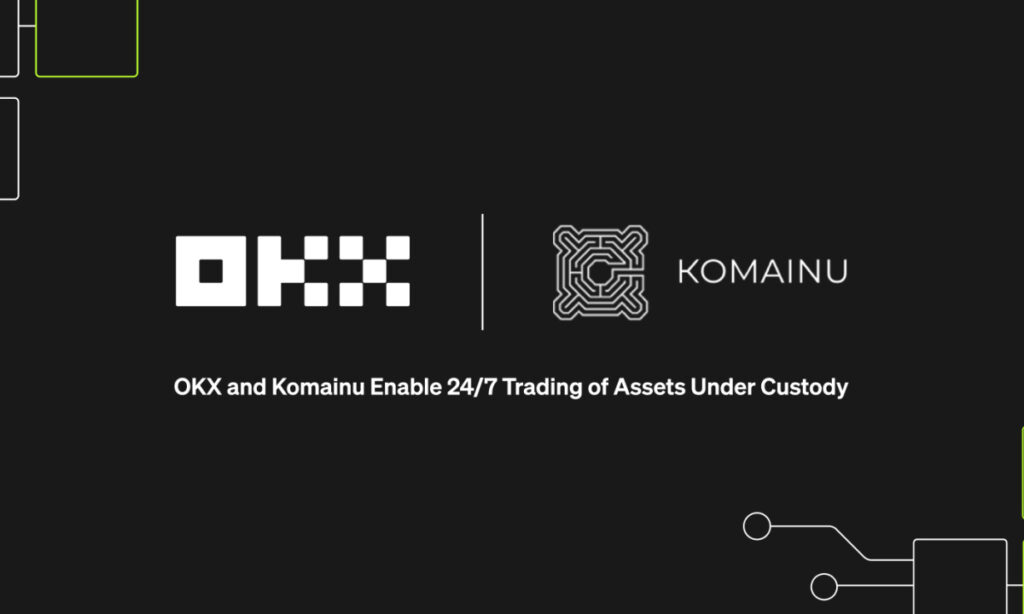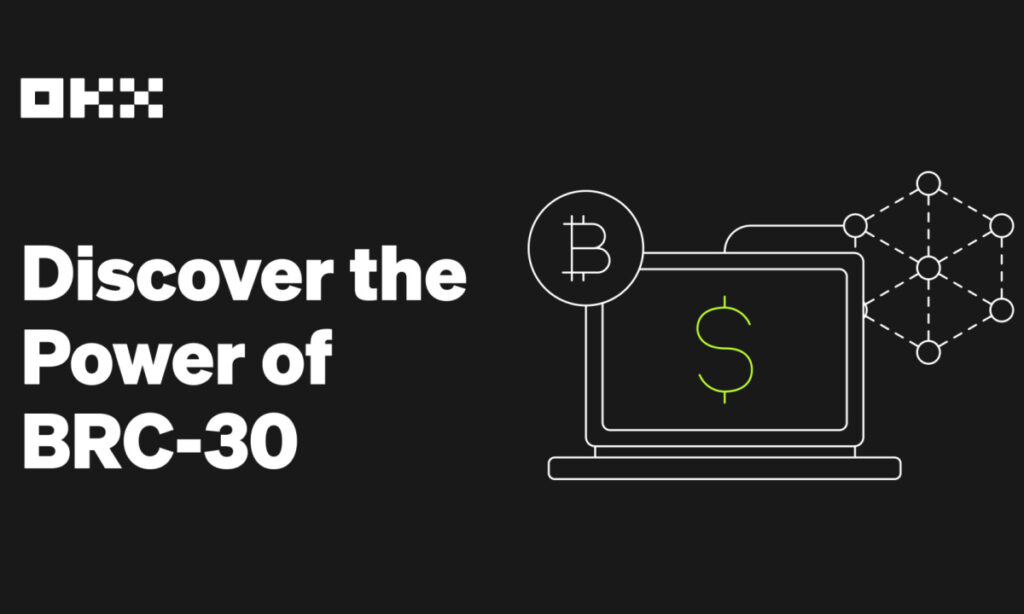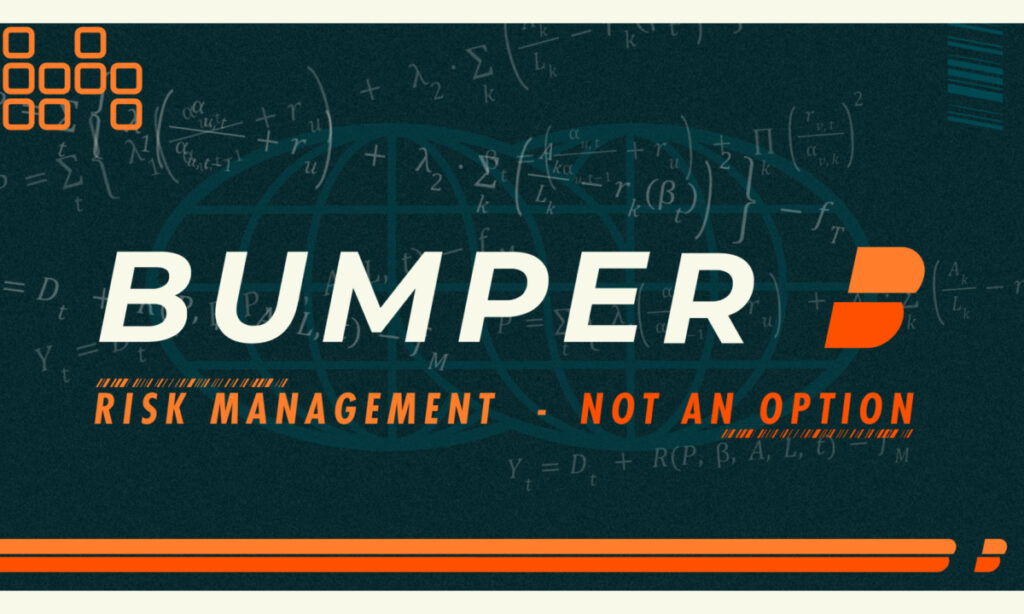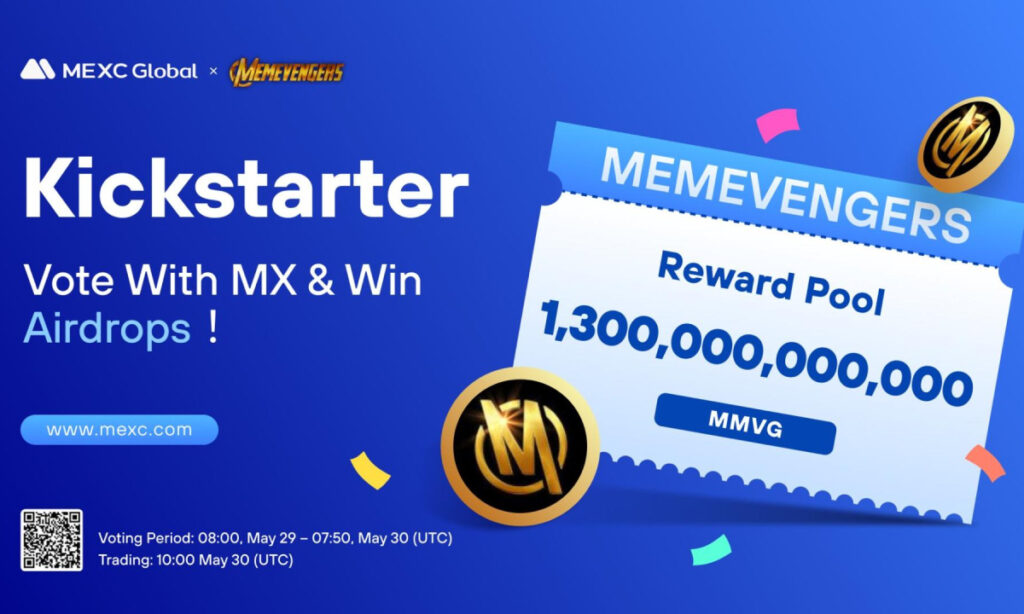London, United Kingdom, June 6th, 2023, Chainwire
CoinMarketCap’s flagship Web3 conference “Catalyst” has opened early-bird registration. The conference will take place at the (Lisbon Congress Centre, Portugal), on February 21st ~ 22nd, 2024. Catalyst will bring together the world’s brightest minds in technology, art, philosophy, and finance to reimagine the future of Web3.
The Conference, originally scheduled for October 2023, has been changed to February 2024. This decision was made following careful consideration by the event organizers. With an already congested European conference calendar in Q4 2023, CoinMarketCap’s Catalyst conference will provide more value to attendees, speakers and the industry at large with its new date.
Tickets are limited for this exclusive gathering and will be available on a first-come, first-served basis through the Catalyst website. Payment for the tickets can be made with fiat.
With the European crypto scene thriving, Lisbon serves as the perfect backdrop for this groundbreaking event. The Catalyst conference will provide a platform for innovative discussions and collaborations that will shape the industry’s future. This is the ideal opportunity for professionals and enthusiasts to come together, exchange ideas, and drive the next big breakthrough in the crypto world.
Rush Luton, CEO of CoinMarketCap, said that Catalyst would bring together experts “to collaborate and learn about upcoming trends, challenges, and opportunities.” In alignment with the conference’s title, Luton stated that “Catalyst is designed to spark new ideas and initiatives.”
Conference attendees can expect a high-caliber event featuring some of the most prominent figures in the crypto and blockchain space. Tickets are available on the official Catalyst website. Attendees can follow upcoming announcements on CoinMarketCap’s newsletter and social channels.
Conference Website:
About CoinMarketCap: CoinMarketCap is the world’s most-referenced price-tracking website for crypto assets in the rapidly growing cryptocurrency space. Its mission is to make crypto discoverable and efficient globally by empowering retail users with unbiased, high quality and accurate information for drawing their own informed conclusions.
Contact
Events Team
events@coinmarketcap.com
ST HELLIER, Jersey, June 6th, 2023, Chainwire
OKX, the world’s second-largest cryptocurrency exchange by trading volume and a leading Web3 technology company, and regulated digital asset custody service provider Komainu, today announced that OKX has joined collateral management platform Komainu Connect, enabling institutional customers to conduct secure 24/7 trading of segregated assets under custody through the OKX platform.
Launched in April of 2023, Komainu Connect reduces client counterparty risk by removing the need to store collateral with trading counterparties, and offering the ability to keep assets in safe custody instead.
Nicolas Bertrand, CEO at Komainu, said: “This strategic partnership marks a milestone in our mission to provide secure and compliant digital asset custody solutions. OKX’s reputation as a leading cryptocurrency exchange, combined with our expertise in institutional-grade custody services is paving the way for a new era of trust and innovation in the industry.”
Sebastian Widmann, Head of Strategy at Komainu, said: “Komainu Connect is rapidly emerging as the leading collateral management solution. Partnering with one of the world’s largest crypto exchanges is a testament to the infrastructure and expertise committed to this service and our focus remains on seamless execution for all parties.”
Lennix Lai, Global Chief Commercial Officer at OKX, said: “Institutions need the peace of mind that comes with knowing their assets are being kept safe with a leading custodian, while retaining their ability to capitalize when investment opportunities arise. That is why we are delighted to partner with Komainu to allow investors a way to keep their assets secure while not compromising on returns.”
The off-exchange settlement and tripartite mirroring solution is a significant step forward for large-scale institutional crypto traders requiring immediate access to OKX’s market-leading portfolio margin account mode and liquid markets.
Komainu was established in 2018 to provide institutions with a secure and compliant custody service for investment in digital assets. Launched in June 2020, Komainu currently custodies assets for exchanges, financial institutions, asset managers, corporations, and government agencies.
Find out more about why institutions choose OKX here.
About OKX
OKX is a world-leading technology company building the future of Web3. Known as the most reliable crypto trading platform for traders, OKX’s crypto exchange is the second largest globally by trading volume.
OKX’s leading self-custody solutions include the Web3-compatible OKX Wallet, which allows users greater control of their assets while expanding access to DEXs, NFT marketplaces, DeFi, GameFi and thousands of dApps.
OKX partners with a number of the world’s top brands and athletes, including English Premier League champions Manchester City F.C., McLaren Formula 1, The Tribeca Festival, golfer Ian Poulter, Olympian Scotty James, and F1 driver Daniel Ricciardo.
OKX is committed to transparency and security and publishes its Proof of Reserves on a monthly basis.
To learn more about OKX, download OKX’s app or visit: okx.com
About Komainu
Komainu is a regulated digital asset custodian built by institutions for institutions and created as a joint venture between Nomura, digital asset manager CoinShares, and digital asset security company Ledger. Offering multi-asset support with regulatory compliance, Komainu is merging traditional financial services with leading security standards for the next generation of institutional custody. Headquartered in Jersey and with offices in London, Dublin, Dubai, and Singapore, Komainu is regulated by the Jersey Financial Services Commission (JFSC) and Dubai Virtual Assets Regulatory Authority (VARA). For more information, visit https://www.komainu.com
Media Contact: Armel Leslie, Peaks Strategies, +1 (914) 320-7620, aleslie@peaksstrategies.com
DISCLAIMER
This announcement is provided for informational purposes only. It is not intended to provide any investment, tax, or legal advice, nor should it be considered an offer to purchase, sell, or hold digital assets. Digital assets, including stablecoins, involve a high degree of risk, can fluctuate greatly, and can even become worthless. You should carefully consider whether trading or holding digital assets is suitable for you in light of your financial condition. Please consult your legal/tax/investment professional for questions about your specific circumstances.
Contact
Media
OKX
media@okx.com
Los Angeles, USA, June 2nd, 2023, Chainwire
OvalPixel announced the launch of its groundbreaking blockchain-powered artificial intelligence (AI) trivia game that pays players in crypto tokens.
The OvalPixel AI game token with symbol $OPAIG allows players of all ages and experience levels, from gamers to grandmas, to earn OPAIG utility tokens by correctly answering trivia/quiz questions generated in real time by OvalPixel’s innovative AI system.
We live in an age of constant connectivity and information at our fingertips. But one thing has been missing—until now. OPAIG is the first play-to-earn game that harnesses the power of AI, blockchain technology and crypto to revolutionize how people play and interact.
Players can then exchange their OPAIG tokens for real money through the Banana Crystal Payments platform or use them in-game to buy exciting 3D NFT trophies from the FlatPyramid 3D Model Marketplace.
To enable mainstream audience access, OvalPixel has partnered with Banana Crystal Payments. This allows anyone to play OPAIG and earn tokens which they can simply convert to USDT digital dollars. No complex crypto knowledge is needed.
OvalPixel will institute a continuous buyback and burn mechanism to increase the value of OPAIG tokens over time. In addition to buying back and burning OPAIG tokens, OvalPixel will also buy back redeemed tokens and reintroduce them into the rewards pool. Thus, preventing the need to mint additional tokens and inflating the supply, and helping with the preservation of OPAIG’s value.
This means that early adopters stand to gain the most as supply decreases and demand rises. The company will also airdrop free OPAIG tokens to early adopters and players.
“We believe OPAIG represents the future of gaming, AI and blockchain technology,” said OvalPixel CEO George Egbuonu. “For the first time, we have created a seamless experience that fuses these revolutionary technologies in an accessible way for the masses. Players of all backgrounds can now enjoy the benefits of crypto and be rewarded for expanding their knowledge.”
The OPAIG game is available now for play on the OvalPixel website. OvalPixel aims to onboard millions of active players in the first year and demonstrate how blockchain and AI can go mainstream. The revolution starts today at OvalPixel with the fusion of AI, blockchain technology and crypto. Users can play to earn and get paid in crypto.
OPAIG token is now trading on the Uniswap Polygon chain (Trading Pair: $OPAIG – $MATIC). Users can take part in the revolution and play to earn real crypto rewards.
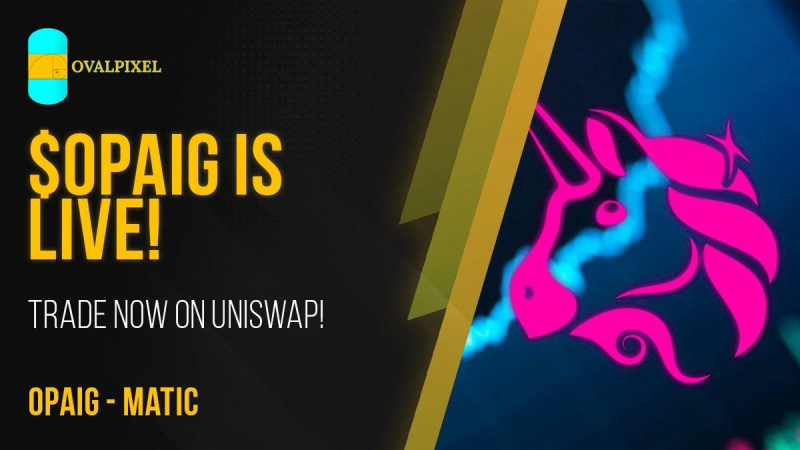
About OvalPixel
OvalPixel provides a Play to Earn Blockchain-Powered AI Trivia & Quiz Game. The AI game generates new trivia multiple choice questions and answers on any topic on-demand so players are always challenged and expanding their knowledge. Players can play with ease and win OPAIG utility tokens and redeem them for digital dollars through the Banana Crystal payment platform.
Visit: https://ovalpixel.com/https://www.youtube.com/embed/a4B14_DbQLE?showinfo=0
About Banana Crystal Payments
Banana Crystal is the leading peer-to-peer payment provider enabling user-friendly web3 payment technology. It provides onramp and offramp crypto-fiat and vice versa solutions as the official payment network for AI and Gaming Applications. It is the only payment network that works anywhere and everywhere in the world and its users are able to send and receive payments for FREE.
Visit: https://www.bananacrystal.com/
Contact
OvalPixel AI Trivia Game | Play2Earn $OPAIG Tokens
OvalPixel
info@ovalpixel.com
Singapore, Singapore, June 2nd, 2023, Chainwire
Pink Moon Studios, a leading innovator in the Web3 gaming industry, is thrilled to announce the launch of their latest sensation, “KMON: World of Kogaea.” This immersive 3D open-world game, available initially to Kryptomon NFT holders, underscores Pink Moon Studios’ expertise in crafting groundbreaking NFT metaverse games, harnessing the power of state-of-the-art Web3 gaming technologies.
Unveiling Pink Moon Shards: Ultra-Exclusive NFT Rewards for “KMON: World of Kogaea” Players
Pink Moon Studios has orchestrated a series of immersive campaign activities to celebrate the game’s launch. Foremost among these is the introduction of the “Pink Moon Shards,” unique tokens crafted using ERC-1125 blockchain technology that will be only available by completing the quests players will be given in World of Kogaea during the Early-Community Preview events. Exclusive to the game’s Early-Community Preview launch events, these shards will serve as tradable NFTs, bringing unprecedented rewards to the players.
The Pink Moon Shards present a unique opportunity for players to later interact during the game’s official release with the “KMON Forge,” Pink Moon’s pioneering on-chain crafting system. This system allows players to craft limited-edition NFTs that can’t be found elsewhere in the game, offering holding players significant advantages throughout the KMON Game Saga. Following the game’s official release, the shards will be airdropped into the players’ wallets based on their performance and event participation.

Brian Bento, the Chief Product Officer at Pink Moon Studios, shares his enthusiasm: “The launch of our initial community tech preview for ‘KMON: World of Kogaea’ is a monumental event we’ve eagerly awaited. It’s an invitation to our players to be the first to experience this new massive world we’ve brought to life. The unveiling of the exclusive Pink Moon Shards is equally exciting. These unique tokens represent a pioneering approach to in-game rewards, enhancing our players’ experience while enriching our gaming ecosystem. I’m ecstatic about what we’re bringing to the world of Web3 gaming, and I can’t wait to see our players dive into the captivating world of Kogaea to see what we have in store for them in the future.”
In addition to the exclusive shards, Pink Moon Studios will launch a vibrant community campaign spanning various social media platforms, in which participants will get an opportunity to win free Kryptomon NFTs for completing a few simple steps, providing a compelling incentive for players to engage in the celebration of the game’s official release. More information about the campaign can be found on the official website of KMON World of Kogaea.
Meet the Creators: Exclusive Live Streaming Event
To commemorate this exciting release, Pink Moon Studios will host an exclusive live-streaming event where the community can meet the team behind “KMON: World of Kogaea”. The creators will step into the world they’ve designed, exploring and experiencing it alongside community members while providing insights about the game’s creation and its unique Web3 gaming mechanics. This exclusive streaming event, which will feature Pink Moon Studios’ CEO Umberto Canessa Cerchi and other leadership members, will take place during the launch week. The exact date and time of the event will be announced in the next few days on the company’s official Facebook, Discord, and Telegram channels.
Revolutionizing the Gaming Industry with KMON Games
Since its inception, Pink Moon Studios has been at the forefront of innovation in the gaming landscape with its KMON Game Saga, all powered by the transformative potential of blockchain technology. This dynamic gaming universe allows players to breed, train, and battle with their NFT Kryptomon, forging unique digital companions.
The long-awaited “KMON: World of Kogaea” is a ground-breaking Web3 blockchain-enabled game that plunges players into an extraordinary 3D open-world metaverse experience, seamlessly integrating with the other two KMON games “Genesis”, its 2D casual training and battling game, and “Pink Moon”, the company’s AR treasure-hunt game. “World of Kogaea” offers players a multifaceted interaction with their Kryptomon NFTs across multiple platforms, propelling the gaming experience to unprecedented levels. https://www.youtube.com/embed/fjXTUN2oCXI?showinfo=0
The “KMON: World of Kogaea” launch is a testament to Pink Moon Studios’ robust capabilities and achievements in the Web3 gaming industry. As the world of blockchain technology continues to evolve, the gaming experiences offered by innovators like Pink Moon Studios promise to ascend to even more impressive heights. Umberto Canessa Cerchi, the CEO of Pink Moon Studios, expressed his excitement about the launch: “The unveiling of “KMON: World of Kogaea” marks a significant milestone for Pink Moon Studios and the Web3 gaming industry. This revolutionary game underscores our commitment to leveraging the power of blockchain technology and our groundbreaking Web3 gaming technologies to redefine the gaming landscape.”
Riding the Wave of Remarkable Success
Pink Moon Studios has already demonstrated significant success, amassing a noteworthy $11.4 million in two funding rounds and fostering a dedicated community of almost 450,000 members across various social platforms. This achievement reflects the company’s commitment to creating immersive gaming experiences and has drawn the attention of industry-leading partners, including Binance NFT, Crypto.com NFT, and others. Already during its first seven months of existence, Pink Moon Studios has generated over $18M in Kryptomon NFT transaction volumes alone, demonstrating its ability to fascinate the gaming community.
Beyond funding and partnerships, Pink Moon Studios’ relentless pursuit of innovation has led to the development of path-breaking technologies. These include the unique “Diamond Contract” and the on-chain “NFT Forging System,” allowing players to engage with their Kryptomon innovatively, fostering a unique digital bond.
Additionally, introducing its crypto and non-crypto user-friendly “Trainer Hub” and “KMarket” NFT marketplace has revolutionized how players buy and sell blockchain-based assets, providing seamless transactions without prior crypto knowledge or a crypto wallet.
The Dawn of a New Era in Gaming
The debut of “KMON: World of Kogaea” marks the beginning of an exciting new chapter in gaming, promising even more thrilling, immersive, and engaging experiences. As Pink Moon Studios continues to redefine the gaming industry with its unique blend of cutting-edge technology and inventive gameplay, it’s well-positioned to become a trendsetter in the rapidly evolving world of digital entertainment.
“KMON: World of Kogaea” is just the beginning, and the gaming community eagerly awaits the new waves of innovation that Pink Moon Studios is set to bring in the years to come. The future is certainly promising for Pink Moon Studios as they continue their journey, redefining the gaming landscape and delivering unparalleled experiences to players around the globe.
About Pink Moon Studios
Pink Moon Studios, initially known as Kryptomon, is a cutting-edge technology company established in 2021, specializing in pioneering Web3 gaming solutions. Composed of a vibrant team of experienced developers and entrepreneurs, they harness the power of blockchain technology, non-fungible tokens (NFTs), and augmented reality (AR) to reshape the gaming industry. Offering a suite of innovative services including the Diamond Contract, NFT Forging, Phygital NFTs, and the AR NFT Hunt, Pink Moon Studio aims to create immersive, engaging, and innovative gaming experiences that transcend traditional gaming boundaries. In addition to gaming innovation, Pink Moon Studio is deeply committed to social responsibility and environmental sustainability, indicating their dedication to driving positive change in the world. Their vision is not only to revolutionize gaming but also to foster a more responsible and sustainable future for the industry.
Contact
Chief Business Development Officer
Tomer Warschauer Nuni
Pink Moon Studios
tomer@pink-moon.studio
+1 (347) 527-9811
SAN FRANCISCO, UNITED STATES, June 1st, 2023, Chainwire
OKX, a leading Web3 company, today introduced its proposal for a new, open-source BRC-30 protocol that enables staking of BRC-20 tokens and Bitcoin in order to earn BRC-30 tokens. The protocol is open-source and available for all developers to build upon.
OKX Wallet will add support for the BRC-30 standard according to the protocol, enabling users to earn passive income by staking BRC-20 tokens or Bitcoin on Web3 Earn without actively trading. This complements the existing range of curated DeFi earning products already available through the platform.
The introduction of BRC-30 and its staking functionalities is driven by OKX’s goal to provide users with additional opportunities to participate in the Bitcoin ecosystem and earn passive income.
OKX Chief Innovation Officer Jason Lau said: “We’re thrilled to have proposed and pioneered the BRC-30 standard to enable Bitcoin and BRC-20 token staking. With the OKX Wallet soon to incorporate BRC-30 support, users will be able to access Bitcoin staking and earn opportunities across multiple-chains. With the Bitcoin ecosystem seeing an explosion of new development, we’re proud to work with developers and projects across the community to contribute to the growth of the wider ecosystem.”
OKX is a longstanding supporter of Bitcoin, having integrated the Lightning Network to its centralized exchange over two years ago. OKX Wallet is also the first multi-chain wallet to support BRC-20 trading with the launch of its Ordinals Marketplace, as well as the viewing and transfer of Bitcoin Ordinals.
About OKX
A leading global technology company driving the future of Web3, OKX provides a comprehensive suite of products to meet the needs of beginners and experts alike, including the OKX Wallet, NFT Marketplace, DEX and Web3 Earn.
OKX partners with a number of the world’s top brands and athletes, including: English Premier League champions Manchester City F.C., McLaren Formula 1, The Tribeca Festival, golfer Ian Poulter, Olympian Scotty James, and F1 driver Daniel Ricciardo.
As a leader building innovative technology products, OKX believes in challenging the status quo. The company recently launched a global brand campaign entitled, The System Needs a Rewrite, which advocates for a new paradigm led by Web3 self-managed technology to replace existing centralized systems.
To learn more about OKX, download our app or visit: okx.com
Disclaimer
THIS ANNOUNCEMENT IS PROVIDED FOR INFORMATIONAL PURPOSES ONLY. IT IS NOT INTENDED TO PROVIDE ANY INVESTMENT, TAX, OR LEGAL ADVICE, NOR SHOULD IT BE CONSIDERED AN OFFER TO PURCHASE, SELL, OR HOLD DIGITAL ASSETS. DIGITAL ASSETS, INCLUDING STABLECOINS, INVOLVE A HIGH DEGREE OF RISK, CAN FLUCTUATE GREATLY, AND CAN EVEN BECOME WORTHLESS. OKX IS NOT REGULATED BY THE FCA, THUS, PROTECTIONS SUCH AS THE FINANCIAL OMBUDSMAN SERVICE OR FINANCIAL SERVICES COMPENSATION SCHEME WILL NOT BE AVAILABLE. YOU SHOULD CONSIDER WHETHER YOU UNDERSTAND HOW CRYPTO WORKS AND WHETHER TRADING OR HOLDING DIGITAL ASSETS IS SUITABLE FOR YOU IN LIGHT OF YOUR FINANCIAL CONDITION. THE VALUE OF YOUR DIGITAL ASSETS, INCLUDING STABLECOINS, CAN INCREASE OR DECREASE AND PROFITS MAY BE SUBJECT TO CAPITAL GAINS TAX. PAST PERFORMANCE DOES NOT INDICATE FUTURE RESULTS. OKX IS NOT ASSOCIATED WITH ANY PARTICULAR DEFI PROTOCOL, MAKES NO WARRANTIES, REPRESENTATIONS OR UNDERTAKINGS RELATING TO ANY DEFI PROTOCOL’S OFFERINGS, AND IS NOT RESPONSIBLE OR LIABLE FOR ANY DIRECT OR INDIRECT LOSS OR OTHER DAMAGE ARISING FROM YOUR USE OF ANY DEFI PROTOCOL. OKX WALLET IS AN AGGREGATOR; ALL DISPLAYED ESTIMATED RETURN RATES ARE PROVIDED BY THE DEFI PROTOCOL, AND ARE NOT GUARANTEED NOR INDICATIVE OF FUTURE RETURNS. PLEASE CONDUCT YOUR OWN DUE DILIGENCE BEFORE INVESTING IN ANY DEFI PROTOCOL. PLEASE CONSULT YOUR LEGAL/TAX/INVESTMENT PROFESSIONAL FOR QUESTIONS ABOUT YOUR SPECIFIC CIRCUMSTANCES.
Contact
OKX
media@okx.com
London, United Kingdom, May 31st, 2023, Chainwire
Marking a seismic shift in the digital asset landscape, DeFi platform Bumper today unveiled the findings of their comprehensive simulation, exhibiting new pricing efficiencies over traditional options desks ahead of the protocol launch in August 2023.
This report delineates a milestone in financial technology, showcasing an altogether new financial instrument that consistently outperforms existing options desks in generating both competitive premia and sustainable yields, backtested against genuine, multi-year historical cryptocurrency market data and options prices.
The report is the culmination of a two-year exercise in Research and Development powered by a $20m investment and derived in collaboration with CADLabs and the Swiss Centre for Cryptoeconomics.
Key highlights from the simulation report:
- On average, Bumper Takers paid 9.3% cheaper premia than buyers of traditional put options.
- During the 2022 bear market, Bumper’s simulation showed a yield improvement of 46.2% for Makers compared to options pricing, without resorting to token incentives.
- The protocol remained solvent throughout the simulated conditions.
- Despite having different inputs and methodology, Bumper’s results reveal a remarkable correlation with the Nobel Prize-winning Black-Scholes model.
These results have been pivotal in understanding and honing the resilience of the Bumper protocol across diverse market conditions.
On the release of the report, Bumper CEO Jonathan DeCarteret expressed, “By challenging and potentially reshaping the accepted norms of options pricing, Bumper stands to revolutionise not just the crypto options market, but also has the potential to penetrate traditional finance and disrupt the colossal $13T derivatives market in the future.”
The report underscores the anticipated outcomes of Bumper’s dynamic pricing, based on forward volatility rather than the usual implied volatility.
The findings of the simulation report positions Bumper as an immensely appealing prospect for institutions and fund managers, in addition to retail crypto investors.
The economic simulation report released today marks the most significant validation of Bumper’s innovative approach to date, and signals what could be one of the most substantial challenges to the Black-Scholes derived pricing in half a century.
Read Bumper’s simulation report here and for more information on the protocol visit https://bumper.fi.
About Bumper
Bumper is a DeFi risk market that provides protection from downside volatility in the price of crypto assets. Users buying protection (Takers) set a price at which they wish to protect their crypto should the price fall, but they don’t lose out if the market heads upwards. Conversely, other users (Makers) earn a yield by providing stablecoin liquidity to the protocol.
Learn more about Bumper
Website | Twitter | Discord | Youtube
Contact
CMO
Jason Suttie
Bumper
marketing@bumper.fi
Mahe, Seychelles, May 30th, 2023, Chainwire
DigiFinex, one of the leading cryptocurrency exchanges in the world, has been granted a Pre-Registration Undertaking (“PRU”) exemption-based approval by the Canadian regulator (at the provincial level, Alberta Securities Commission and other provinces providing reciprocal recognition). This license allows DigiFinex to operate in Canada in accordance with the terms of the PRU agreed with the regulator, and provides a unique opportunity for Canadian clients to buy and sell cryptocurrencies on DigiFinex’s platform.
The PRU agreed upon is the result of a lengthy and prudent discussion with the regulator, and is a crucial regulatory requirement for cryptocurrency participants wanting to operate a dealer platform in Canada. To comply with the PRU, DigiFinex needs to put in place stringent measures to prevent money laundering and terrorist financing. The regulator also demands adequate security systems be established and maintained to protect investors’ assets and personal information.
Additionally, DigiFinex must ensure that it has proper risk management procedures in place to safeguard against market manipulation and other fraudulent activities.DigiFinex’s PRU was announced officially by the regulator in March 2023, making it one of a handful of operators with a certain pathway and timeline for achieving full approval from the Canadian government in the coming months. This achievement highlights DigiFinex’s commitment to providing a safe and secure platform for its users, in line with prevalent market and regulatory demand.
DigiFinex has always placed a strong emphasis on the Canadian market. In recent times, the collapse of prominent industry participants has caused a collective crisis of confidence in the crypto industry. In response, DigiFinex looked at ways to improve transparency, security and efficiency towards keeping client assets safe without compromising other aspects of its services. DigiFinex has partnered with Qualified Custodian Tetra Trust, bringing access to a qualified custodian solution. As a regulated trust company, Tetra’s offering encompasses robust controls, including the maintenance of a suite of insurance products.
In addition, Tetra’s partners maintain comprehensive client asset crime indemnity underwritten by a syndicate led by UK-based insurance powerhouse Lloyds. Along with other licensed dealer platforms in Canada, DigiFinex sets a new standard for asset protection in the industry and will undoubtedly attract more investors and traders to the platform.
DigiFinex is also committed to global compliance operations, working closely with regulatory agencies worldwide to achieve regulatory requirements. As a stable and reputable platform operating in the industry since 2018, DigiFinex prioritized the provision of transparency and reliability in cryptocurrency trading. The platform offers a wide range of trading pairs, advanced trading tools and a user-friendly interface, making it easy for both beginners and experienced traders to navigate.
The PRU exemption-based license is an important milestone for DigiFinex, epitomising its focus on providing its users with a safe and secure platform. The new regulatory regime highlights the increasing importance of regulatory compliance in the cryptocurrency industry and underscores the need for cryptocurrency participants to work closely with regulatory agencies to promote a safe and secure trading environment.
About DigiFinex
DigiFinex, originating from Singapore and established in 2017, is a leading global cryptocurrency exchange. Upholding the values of diversity, integrity, and trustworthiness, DigiFinex provides users with secure 24/7 services for buying, selling, trading, storing, and staking cryptocurrencies.
For more information, please visit: Official Website | Telegram | Twitter | Medium | LinkedIn
Contact
henry
DIGIFINEX LIMITED
henry_lin@digifinex.org
New York, New York, USA, May 29th, 2023, Chainwire
Memevengers coin ($MMVG) has been gaining attention following a Uniswap listing on May 25th. $MMVG reached a market cap of over $20 Million and a $1 Million trading volume.
The Memevengers coin $MMVG can be traded on Uniswap where it is paired against WETH. In addition, liquidity for the token is set to increase further when $MMVG lists on MEXC at 10am UTC on May 30th. The team hopes that Memevengers will improve global access to the memecoin and provide interested users with a new opportunity to be a part of the ecosystem as it begins the next leg of its journey.
About Memevengers:
Memevengers $MMVG(ETH) is a memecoin that represents the War of Memes. The Final War that will Change the Destiny of Memes Unfolds. Crushing Villains and Preserving Peace.
Memevengers are the source of this content. This Press Release is for informational purposes only. The information does not constitute investment advice or an offer to invest.
Contact
MEMEVENGERS
memevengers1963@gmail.com
London, England, May 26th, 2023, Chainwire
World Mobile has announced the successful launch of its commercial telecom network in Zanzibar. The official debut of World Mobile in the East African territory means Zanzibaris can enjoy mobile data that is 50% cheaper than the national average.
The transition from a proof of concept to a commercial model has been supported by the launch of World Mobile’s Android application on Google Play. The Android app simplifies data bundle management in addition to providing a platform for users to create a self-sovereign identifier and take advantage of a host of value-added services.
World Mobile CEO Micky Watkins said: “Today marks a significant milestone for World Mobile as we proudly announce the successful commercial transition of our network in Zanzibar. We are thrilled to welcome our first paying customers and embark on a journey to connect the unconnected, empowering individuals across Africa and beyond.”
Following the move to a commercial model, World Mobile has updated its network explorer, WMTScan, which now reports the top earning AirNodes, as part of its commitment to building a transparent sharing economy.
Demand for World Mobile’s affordable mobile data service has been strong in Zanzibar, with 1,000 new customers signing up per week and a peak daily user count of 16,000 during May 2023. This is a significant achievement for the Tanzanian archipelago, whose population numbers around 1.8m.
The proof of concept network was initially deployed as a subsidised, test service available across World Mobile’s network of AirNodes. The semi-autonomous territory was chosen to pilot World Mobile’s hybrid-connectivity network due to the limitations of extant providers. Internet penetration in Tanzania stands at around 46%, with access concentrated mainly in urban areas. These challenges have negative economic implications, as businesses struggle to participate fully in the digital economy.
World Mobile aims to succeed in solving a problem that has attracted the attention of tech giants such as Google and Facebook, starting with building a sharing economy that will fund the deployment of telecommunications infrastructure in rural Africa and beyond. World Mobile’s solution provides connectivity at a cost multiples lower than traditional mobile network operators.
About World Mobile
World Mobile was founded with a far-reaching goal: to connect everyone, everywhere while advocating for economic freedom and dignity. Unlike traditional mobile networks, World Mobile is based on blockchain and the sharing economy. Local business owners in unconnected regions can operate affordable nodes on its network and bring their community online while sharing the rewards.
Learn more: https://worldmobile.io/
Contact
Dan Edelstein
pr@marketacross.com
New Yok, USA / New York, May 26th, 2023, Chainwire
The memecoin storm has taken the crypto market by surprise, with prominent projects like ‘PEPE ($PEPE),’ confidently asserting its presence alongside the original meme coin, ‘Dogecoin $(DOGE).’, ‘Shiba Inu ($SHIB),’ ‘Baby Doge Coin ($BabyDoge),’ the rapidly growing ‘FLOKI ($FLOKI),’ the new project ‘I LOVE SNOOPY ($LOVESNOOPY), and ‘Milady Meme Coin ($LADYS).’ These seven meme coins have inspired the team behind the “Memevengers ($MMVG)” project.
The Memevengers’ project is an innovative storyline that depicts “The ultimate battle that will shape the destiny of memes is underway.”, according to the team. It introduces the “Memevengers” as a legion of heroes safeguarding the meme universe (Memeverse), cleverly pairing each meme character with a Marvel counterpart.

The Memevengers does not possess a distinctive ecosystem or advanced utility, as the “Heronomics” (tokenomics) and “Heroic Road” (roadmap) align with the typical traits of meme coins.
Inspired by the motifs of popular memes such as Pepe, Shiba Inu, and Floki, as well as Avengers members like Captain America, Iron Man, and Hulk, the Memevengers have garnered 25,000 followers since their launch. The team hopes their fanbase continues to expand at a the current pace. With their striking meme concept, the team is excited for the future developments of the project.
About Memevengers:
Memevengers $MMVG(ETH) is a memecoin that represent s the War of Memes. The Final War that will Change the Destiny of Memes Unfolds. Crushing Villains and Preserving Peace.
Memevengers is the source of this content. This Press Release is for informational purposes only. The information does not constitute investment advice or an offer to invest.
Contact
MEMEVENGERS
memevengers1963@gmail.com




